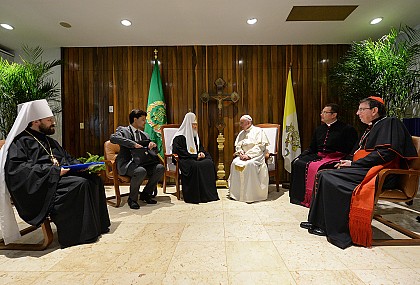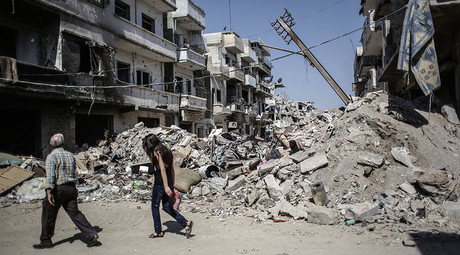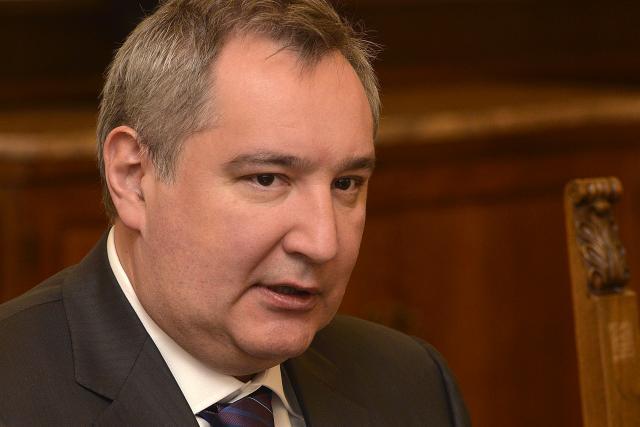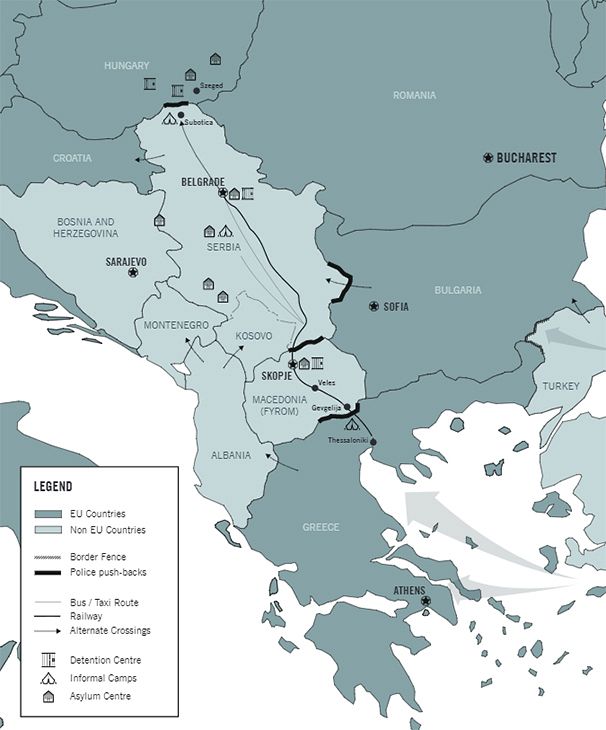
Joint Declaration
of Pope Francis
and Patriarch Kirill of Moscow and all Russia
12 February 2016
“The
grace of the Lord Jesus Christ and the love of God the Father and the
fellowship of the holy Spirit be with all of you” (2 Cor 13:13).
- By God
the Father’s will, from which all gifts come, in the name of our Lord
Jesus Christ, and with the help of the Holy Spirit Consolator, we, Pope
Francis and Kirill, Patriarch of Moscow and All Russia, have met today
in Havana. We give thanks to God, glorified in the Trinity, for this
meeting, the first in history.
It is with joy that we have met like brothers in the Christian faith who encounter one another “to speak face to face” (2 Jn 12),
from heart to heart, to discuss the mutual relations between the
Churches, the crucial problems of our faithful, and the outlook for the
progress of human civilization.
- Our fraternal meeting has taken
place in Cuba, at the crossroads of North and South, East and West. It
is from this island, the symbol of the hopes of the “New World” and the
dramatic events of the history of the twentieth century, that we address
our words to all the peoples of Latin America and of the other
continents.
It is a
source of joy that the Christian faith is growing here in a dynamic way.
The powerful religious potential of Latin America, its centuries–old
Christian tradition, grounded in the personal experience of millions of
people, are the pledge of a great future for this region.
- By meeting far from the longstanding
disputes of the “Old World”, we experience with a particular sense of
urgency the need for the shared labour of Catholics and Orthodox, who
are called, with gentleness and respect, to give an explanation to the world of the hope in us (cf. 1 Pet3:15).
- We thank God for the gifts received
from the coming into the world of His only Son. We share the same
spiritual Tradition of the first millennium of Christianity. The
witnesses of this Tradition are the Most Holy Mother of God, the Virgin
Mary, and the saints we venerate. Among them are innumerable martyrs who
have given witness to their faithfulness to Christ and have become the
“seed of Christians”.
- Notwithstanding this shared
Tradition of the first ten centuries, for nearly one thousand years
Catholics and Orthodox have been deprived of communion in the Eucharist.
We have been divided by wounds caused by old and recent conflicts, by
differences inherited from our ancestors, in the understanding and
expression of our faith in God, one in three Persons – Father, Son and
Holy Spirit. We are pained by the loss of unity, the outcome of human
weakness and of sin, which has occurred despite the priestly prayer of
Christ the Saviour: “So that they may all be one, as you, Father, are in
me and I in you … so that they may be one, as we are one” (Jn17:21).
- Mindful of the permanence of many
obstacles, it is our hope that our meeting may contribute to the
re–establishment of this unity willed by God, for which Christ prayed.
May our meeting inspire Christians throughout the world to pray to the
Lord with renewed fervour for the full unity of all His disciples. In a
world which yearns not only for our words but also for tangible
gestures, may this meeting be a sign of hope for all people of goodwill!
- In our determination to undertake
all that is necessary to overcome the historical divergences we have
inherited, we wish to combine our efforts to give witness to the Gospel
of Christ and to the shared heritage of the Church of the first
millennium, responding together to the challenges of the contemporary
world. Orthodox and Catholics must learn to give unanimously witness in
those spheres in which this is possible and necessary. Human
civilization has entered into a period of epochal change. Our Christian
conscience and our pastoral responsibility compel us not to remain
passive in the face of challenges requiring a shared response.
- Our gaze must firstly turn to those
regions of the world where Christians are victims of persecution. In
many countries of the Middle East and North Africa whole families,
villages and cities of our brothers and sisters in Christ are being
completely exterminated. Their churches are being barbarously ravaged
and looted, their sacred objects profaned, their monuments destroyed. It
is with pain that we call to mind the situation in Syria, Iraq and
other countries of the Middle East, and the massive exodus of Christians
from the land in which our faith was first disseminated and in which
they have lived since the time of the Apostles, together with other
religious communities.
- We call upon the international
community to act urgently in order to prevent the further expulsion of
Christians from the Middle East. In raising our voice in defence of
persecuted Christians, we wish to express our compassion for the
suffering experienced by the faithful of other religious traditions who
have also become victims of civil war, chaos and terrorist violence.
- Thousands of victims have already
been claimed in the violence in Syria and Iraq, which has left many
other millions without a home or means of sustenance. We urge the
international community to seek an end to the violence and terrorism
and, at the same time, to contribute through dialogue to a swift return
to civil peace. Large–scale humanitarian aid must be assured to the
afflicted populations and to the many refugees seeking safety in
neighbouring lands.
We call
upon all those whose influence can be brought to bear upon the destiny
of those kidnapped, including the Metropolitans of Aleppo, Paul and John
Ibrahim, who were taken in April 2013, to make every effort to ensure
their prompt liberation.
- We lift our prayers to Christ, the
Saviour of the world, asking for the return of peace in the Middle East,
“the fruit of justice” (Is32:17), so that fraternal
co–existence among the various populations, Churches and religions may
be strengthened, enabling refugees to return to their homes, wounds to
be healed, and the souls of the slain innocent to rest in peace.
We
address, in a fervent appeal, all the parts that may be involved in the
conflicts to demonstrate good will and to take part in the negotiating
table. At the same time, the international community must undertake
every possible effort to end terrorism through common, joint and
coordinated action. We call on all the countries involved in the
struggle against terrorism to responsible and prudent action. We exhort
all Christians and all believers of God to pray fervently to the
providential Creator of the world to protect His creation from
destruction and not permit a new world war. In order to ensure a solid
and enduring peace, specific efforts must be undertaken to rediscover
the common values uniting us, based on the Gospel of our Lord Jesus
Christ.
- We bow before the martyrdom of those
who, at the cost of their own lives, have given witness to the truth of
the Gospel, preferring death to the denial of Christ. We believe that
these martyrs of our times, who belong to various Churches but who are
united by their shared suffering, are a pledge of the unity of
Christians. It is to you who suffer for Christ’s sake that the word of
the Apostle is directed: “Beloved … rejoice to the extent that you share
in the sufferings of Christ, so that when his glory is revealed you may
also rejoice exultantly” (1 Pet4:12–13).
- Interreligious dialogue is
indispensable in our disturbing times. Differences in the understanding
of religious truths must not impede people of different faiths to live
in peace and harmony. In our current context, religious leaders have the
particular responsibility to educate their faithful in a spirit which
is respectful of the convictions of those belonging to other religious
traditions. Attempts to justify criminal acts with religious slogans are
altogether unacceptable. No crime may be committed in God’s name,
“since God is not the God of disorder but of peace” (1 Cor14:33).
- In affirming the foremost value of
religious freedom, we give thanks to God for the current unprecedented
renewal of the Christian faith in Russia, as well as in many other
countries of Eastern Europe, formerly dominated for decades by atheist
regimes. Today, the chains of militant atheism have been broken and in
many places Christians can now freely confess their faith. Thousands of
new churches have been built over the last quarter of a century, as well
as hundreds of monasteries and theological institutions. Christian
communities undertake notable works in the fields of charitable aid and
social development, providing diversified forms of assistance to the
needy. Orthodox and Catholics often work side by side. Giving witness to
the values of the Gospel they attest to the existence of the shared
spiritual foundations of human co–existence.
- At the same time, we are concerned
about the situation in many countries in which Christians are
increasingly confronted by restrictions to religious freedom, to the
right to witness to one’s convictions and to live in conformity with
them. In particular, we observe that the transformation of some
countries into secularized societies, estranged from all reference to
God and to His truth, constitutes a grave threat to religious freedom.
It is a source of concern for us that there is a current curtailment of
the rights of Christians, if not their outright discrimination, when
certain political forces, guided by an often very aggressive secularist
ideology, seek to relegate them to the margins of public life.
- The process of European integration,
which began after centuries of blood–soaked conflicts, was welcomed by
many with hope, as a guarantee of peace and security. Nonetheless, we
invite vigilance against an integration that is devoid of respect for
religious identities. While remaining open to the contribution of other
religions to our civilization, it is our conviction that Europe must
remain faithful to its Christian roots. We call upon Christians of
Eastern and Western Europe to unite in their shared witness to Christ
and the Gospel, so that Europe may preserve its soul, shaped by two
thousand years of Christian tradition.
- Our gaze is also directed to those
facing serious difficulties, who live in extreme need and poverty while
the material wealth of humanity increases. We cannot remain indifferent
to the destinies of millions of migrants and refugees knocking on the
doors of wealthy nations. The unrelenting consumerism of some more
developed countries is gradually depleting the resources of our planet.
The growing inequality in the distribution of material goods increases
the feeling of the injustice of the international order that has
emerged.
- The Christian churches are called to
defend the demands of justice, the respect for peoples’ traditions, and
an authentic solidarity towards all those who suffer. We Christians
cannot forget that “God chose the foolish of the world to shame the
wise, and God chose the lowly and despised of the world, those who count
for nothing, to reduce to nothing those who are something, that no
human being might boast before God” (1 Cor1:27–29).
- The family is the natural centre of
human life and society. We are concerned about the crisis in the family
in many countries. Orthodox and Catholics share the same conception of
the family, and are called to witness that it is a path of holiness,
testifying to the faithfulness of the spouses in their mutual
interaction, to their openness to the procreation and rearing of their
children, to solidarity between the generations and to respect for the
weakest.
- The family is based on marriage, an
act of freely given and faithful love between a man and a woman. It is
love that seals their union and teaches them to accept one another as a
gift. Marriage is a school of love and faithfulness. We regret that
other forms of cohabitation have been placed on the same level as this
union, while the concept, consecrated in the biblical tradition, of
paternity and maternity as the distinct vocation of man and woman in
marriage is being banished from the public conscience.
21. We call on all to respect the inalienable right to life. Millions are denied the very right to be born into the world. The blood of the unborn cries out to God (cf. Gen 4:10).
The emergence of so-called euthanasia leads elderly people and the
disabled begin to feel that they are a burden on their families and on
society in general. We are also concerned about the development of
biomedical reproduction technology, as the manipulation of human life
represents an attack on the foundations of human existence, created in
the image of God. We believe that it is our duty to recall the
immutability of Christian moral principles, based on respect for the
dignity of the individual called into being according to the Creator’s
plan. 22. Today, in a particular way, we address young Christians. You,
young people, have the task of not hiding your talent in the ground (cf. Mt 25:25),
but of using all the abilities God has given you to confirm Christ’s
truth in the world, incarnating in your own lives the evangelical
commandments of the love of God and of one’s neighbour. Do not be afraid
of going against the current, defending God’s truth, to which
contemporary secular norms are often far from conforming.
23. God loves each of you and expects you to be His disciples and apostles. Be the light of the world so that those around you may see your good deeds and glorify your heavenly Father (cf. Mt 5:14, 16). Raise your children in the Christian faith, transmitting to them the pearl of great price that is the faith (cf.Mt 13:46) you have received from your parents and forbears. Remember that “you have been purchased at a great price” (1 Cor 6:20), at the cost of the death on the cross of the Man–God Jesus Christ.
24.
Orthodox and Catholics are united not only by the shared Tradition of
the Church of the first millennium, but also by the mission to preach
the Gospel of Christ in the world today. This mission entails mutual
respect for members of the Christian communities and excludes any form
of proselytism. We are not competitors but brothers, and this concept
must guide all our mutual actions as well as those directed to the
outside world. We urge Catholics and Orthodox in all countries to learn
to live together in peace and love, and to be “in harmony with one
another” (Rm 15:5). Consequently, it cannot be accepted that
disloyal means be used to incite believers to pass from one Church to
another, denying them their religious freedom and their traditions. We
are called upon to put into practice the precept of the apostle Paul:
“Thus I aspire to proclaim the gospel not where Christ has already been
named, so that I do not build on another’s foundation” (Rm 15:20).
25.
It is our hope that our meeting may also contribute to reconciliation
wherever tensions exist between Greek Catholics and Orthodox. It is
today clear that the past method of “uniatism”, understood as the union
of one community to the other, separating it from its Church, is not the
way to re–establish unity. Nonetheless, the ecclesial communities which
emerged in these historical circumstances have the right to exist and
to undertake all that is necessary to meet the spiritual needs of their
faithful, while seeking to live in peace with their neighbours. Orthodox
and Greek Catholics are in need of reconciliation and of mutually
acceptable forms of co–existence.
26.
We deplore the hostility in Ukraine that has already caused many
victims, inflicted innumerable wounds on peaceful inhabitants and thrown
society into a deep economic and humanitarian crisis. We invite all the
parts involved in the conflict to prudence, to social solidarity and to
action aimed at constructing peace. We invite our Churches in Ukraine
to work towards social harmony, to refrain from taking part in the
confrontation, and to not support any further development of the
conflict.
27.
It is our hope that the schism between the Orthodox faithful in Ukraine
may be overcome through existing canonical norms, that all the Orthodox
Christians of Ukraine may live in peace and harmony, and that the
Catholic communities in the country may contribute to this, in such a
way that our Christian brotherhood may become increasingly evident.
- In the contemporary world, which is
both multiform yet united by a shared destiny, Catholics and Orthodox
are called to work together fraternally in proclaiming the Good News of
salvation, to testify together to the moral dignity and authentic
freedom of the person, “so that the world may believe” (Jn17:21).
This world, in which the spiritual pillars of human existence are
progressively disappearing, awaits from us a compelling Christian
witness in all spheres of personal and social life. Much of the future
of humanity will depend on our capacity to give shared witness to the
Spirit of truth in these difficult times.
- May our bold witness to God’s truth
and to the Good News of salvation be sustained by the Man–God Jesus
Christ, our Lord and Saviour, who strengthens us with the unfailing
promise: “Do not be afraid any longer, little flock, for your Father is
pleased to give you the kingdom” (Lk12:32)!
Christ
is the well–spring of joy and hope. Faith in Him transfigures human
life, fills it with meaning. This is the conviction borne of the
experience of all those to whom Peter refers in his words: “Once you
were ‘no people’ but now you are God’s people; you ‘had not received
mercy’ but now you have received mercy” (1 Pet 2:10).
30.
With grace–filled gratitude for the gift of mutual understanding
manifested during our meeting, let us with hope turn to the Most Holy
Mother of God, invoking her with the words of this ancient prayer: “We
seek refuge under the protection of your mercy, Holy Mother of God”. May
the Blessed Virgin Mary, through her intercession, inspire fraternity
in all those who venerate her, so that they may be reunited, in God’s
own time, in the peace and harmony of the one people of God, for the
glory of the Most Holy and indivisible Trinity!
|
Kirill
Patriarch of Moscow
and all Russia
|
Francis
Bishop of Rome,
Pope of the Catholic Church
|
Department for External Church Relations, www.mospat.ru
|








 Pope Francis meets Patriarch Kirill at Havana airport.
Pope Francis meets Patriarch Kirill at Havana airport.



 Iben Thranholm examines political and social events with
focus on their religious aspects, significance and moral implications.
She is one of Denmark’s most widely read columnists on such matters.
Thranholm is a former editor and radio host at the Danish Broadcasting
Corporation (DR), at which she created a religious news program that set
a new standard for religious analysis in the newsroom. She has traveled
extensively in the Middle East, Italy, the United States and Russia to
carry out research and interviews. She has been awarded for her
investigative research into Danish media coverage of religious issues.
Iben Thranholm examines political and social events with
focus on their religious aspects, significance and moral implications.
She is one of Denmark’s most widely read columnists on such matters.
Thranholm is a former editor and radio host at the Danish Broadcasting
Corporation (DR), at which she created a religious news program that set
a new standard for religious analysis in the newsroom. She has traveled
extensively in the Middle East, Italy, the United States and Russia to
carry out research and interviews. She has been awarded for her
investigative research into Danish media coverage of religious issues. 














